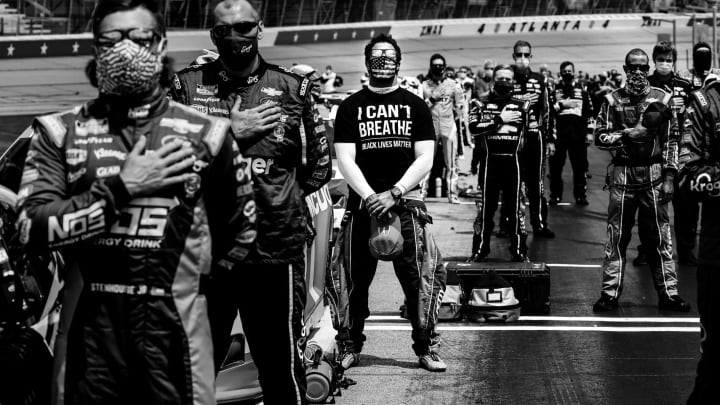
I Want You to See the Story Through My Eyes
Our team was anxious to get to the bubble.
Even though we had a hundred questions about what to expect, we were in good spirits as we boarded the plane. It was sort of surreal to finally have most of our team together in one place. And of course, it was the unofficial start of what will go down as an historic WNBA season.
That day was special for so many reasons.
But I will remember it for one very bad one.
Our team was scattered around the first-class cabin — we scored and got bumped up randomly. About 30, 35 minutes before we landed, I thought I would put my iPad in the overhead bin and grab my book for the last few minutes of the flight. A few people were shuffling around. Our director of basketball operations was standing in the aisle a few rows ahead of me, talking to one of our players and a trainer.
I unfastened my seatbelt and started to get up, but a flight attendant quickly shut me down. “No!” she said, waving her hands in front of me.
I’m thinking, O.K….. There’s this other gentleman in the aisle next to me, plus our operations director up front. What’s the problem? “Excuse me?” I said.
There was a brief back and forth. She said she thought I was trying to go to the front of the plane. I’m trying to figure out why people around me are allowed to move freely. She wasn’t having it, so I finished putting my computer away and quickly sat down.
I knew what was happening. And I knew why it was happening.
Next thing I know, this woman seated in front of me turns around, looks me in my face, rolls her eyes at me, and sighs.
Like audibly sighs.
Like she might as well have just said, “Siiiiiiigh,” it was so obvious she wanted her sigh to be recognized.
Just for the record, I knew what was happening.
And I knew why it was happening.
If you’ve ever been in this situation — if you’ve ever been, for instance, seated in the back at a restaurant, out of view, or followed around in a nice store, or otherwise been one of the few Black people in a majority white space — you probably know why, too.
So, like I said, I knew.
But that didn’t stop me from saying to that lady seated in 2A, “Excuse me, ma’am, is there a problem?”
And she said, “I can tell you don’t fly much. I can tell you don’t go anywhere. I can tell. I can just tell.
Meanwhile, my players are watching the whole scene in awe.
She didn’t stop there. “No, I can tell you don’t fly often. You’re not global.”
At this point, my players just had to laugh.
Now, one thing to know — you’re not supposed to defend yourself when this happens. When you’re seated in the back of the restaurant, for instance, you’re supposed to pretend it was a coincidence. When you’re being followed around in a store, you’re supposed to act like it’s normal. And when you’re one of few Black people in a space where you’re being treated like you don’t belong, you’re supposed to be apologetic, contrite, and take up as little space as possible. This is the unspoken rule that Black people learn to follow from a young age: Do as you’re supposed to. Know your place.
But it’s the year 2020.
So I said: “Ma’am, you’re the reason that the world is in the state that it’s in right now, because of the stuff you’re saying. This is the reason we’re in the state that we’re in as a society.”
Then, the flight attendant, who’d shut me down for standing up like others around me, loudly said at the front of the cabin, “He’s being aggressive.”
That’s tough.
When someone says a black man is being aggressive, that’s it — it’s over. There’s no coming back from that. Anything you say or do will just prove their point.
You don’t even feel angry in a moment like that.
You just feel vulnerable.
Your skin burns with embarrassment. You’ve been muzzled, publicly.
Like you’re not even human.
You don’t even feel angry in a moment like that. You just feel vulnerable.
There was nothing I could do. My players rushed to my side and tried to defend me — but I was rendered helpless. I couldn’t voice my opinion, couldn’t defend myself.
Because if you defend yourself? Then the stigma of you being the Aggressive Black Man gets even worse. To them, anything you do from there, it just “proves” them right.
He’s being aggressive.
Once they put that on you, there’s no getting it off.
It’s on you.
It sticks.
I remember the first time.
I was in Memphis, at home from college, and I had a week or so before I went back. My sister was a senior in high school, and I was picking her up because she had a job interview.
I pulled into the high school parking lot near the bus bay, where school buses drive up to the curb to pick up the students. There was a parents’ waiting area, and so that’s where I headed. I see parents hanging out, waiting. Some are going into the school and other young people my age are walking into the school as well.
I parked the car, and as soon as I got out I heard someone say, “Hey! Hey! Get back in the car. I know what you’re doing here. Get back in the car and go home.” I looked up, and saw it was a police officer.
I was like, “What are you talking about?”
I tried to defend myself. It’s human instinct. I was like, “I don’t know what you’re talking about,” but he insisted. “No — you got to get back in the car.”
“But I’m going….” and before I can tell him, he walks up to me, jacks me up, and throws me down on the hood. I can still hear the hollow thud as my chest hit the front of the car.
He put his hand on the back of my neck and said, “I’m tired of guys like you.”
He put his hand on the back of my neck and said, “I’m tired of guys like you.”
By this time, all the students were in the buses. I was looking at them with my cheek pressed against the hood. And they were looking back at me.
The officer put me in cuffs, and another cop came around. I knew the coaches of that high school because that’s where I went to play in the summertime. So I pleaded, “Could you please call Coach Frank or Coach Dowell? They know me here.” And he was like, “I don’t care. I told you, I gave you a chance, and you weren’t listening. You got an attitude.”
Some (white) parents who were there defended me, said I did nothing wrong — and when Coach Dowell arrived he defended me as well.
The cop said, “He was giving me attitude….” but eventually he took me out of the cuffs.
I’ll never forget the feeling of those cuffs.
After it all happened, Coach Dowell walked me down the hill and said, “I just want to let you know, son, that you didn’t do anything wrong. But these are the things that you’re going to have to face in life. And you just have to be ready for them, and you have to deal with them.”
We shared that moment, and then I took my sister to her interview.
My mom used to work 14 hour days, and by the time we got home she was in bed. I woke her up, and I told her what happened. That moment … it still touches me very deeply, because I cried like a baby. I cried because I thought I did something wrong.
It just hurts.
It hurts because they can say anything about you — and then suddenly it’s “true.” It’s true to them because it’s believable. And they believe it so much that it makes you start to believe it yourself.
It makes you start to think, like — Was that my fault?
It makes you start to doubt who you are.
As a Black man in America, I don’t have the margin for error to not be perfect.
It’s a lot of pressure. But that’s just life for anybody who’s looked down on in society: There’s always going to be so much pressure.
Racism has long been viewed as a Black problem … but I hope people are finally beginning to understand that it’s not. It’s not. It’s an American problem. It’s a world problem.
It’s everyone’s problem.
I hesitated to tell this story for a lot of reasons. It’s very hard to put into words. But the pain and guilt that I felt because I dared to speak up for myself, and dared to question the reasoning behind someone’s behavior — I feel like a lot of people can relate to that.
And I’m so hurt that my players had to experience it with me … but I’m also glad I had them there.
We’ve been doing a lot of Zoom calls lately, as a team, about everything going on in the world surrounding racial injustice — but some things are hard to explain unless you see them for yourself. Or unless they happen in your house.
As a Black man in America, I don’t have the margin for error to not be perfect
My players were able to share my experience, and so, in a way, it happened to them. Somebody that they look up to for counsel, for advice, for direction, was just completely cut down, right in front of them.
And they knew why.
I’m writing this because I want to let them know that I appreciate them.
Sometimes, when that kind of thing happens, only the person going through it is aware. But they noticed, and they supported me, in the way that I try to support and show up for them each and every day.
That’s the thing about us: We care about each other.
If you pay attention to the league and you pay attention to the Chicago Sky, you know that the players fight for each other, and are there for each other. Those are the kinds of players we coach here.
And I’m so proud of them.
I’m so proud of you guys, if you’re reading this.
So let’s let that be the worst part of our trip — and move forward, together.
We’ve got to.
We’ve got lives to live.
And a championship to win.

